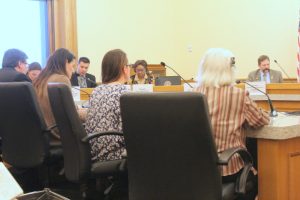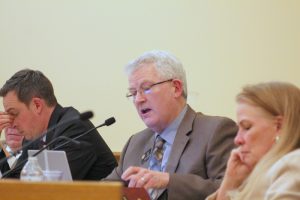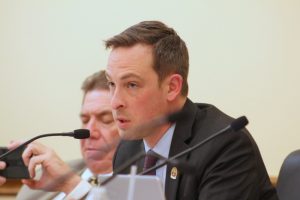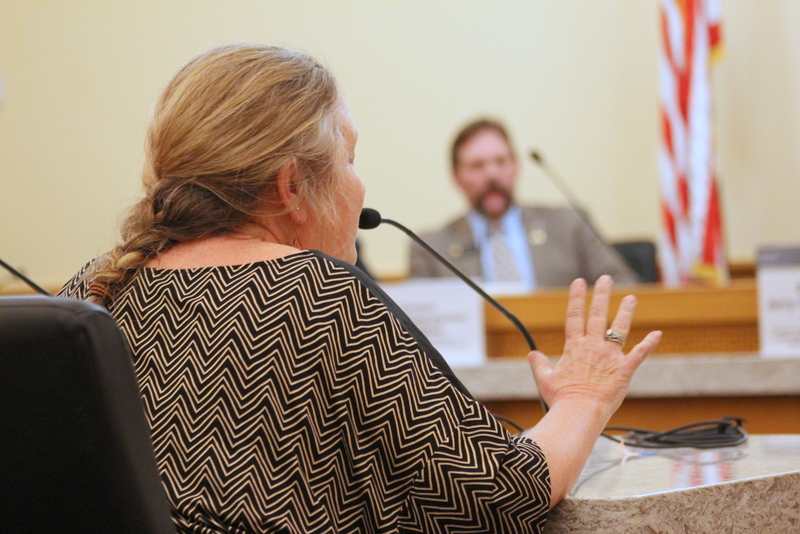Those in opposition to a new bill proposed to charge those with a felony (SB-035) for opposition activity to the oil and gas industry pointed to the wider implications of the bill.
A strict party line vote advanced SB-035 on Thursday which seeks to increase penalties for resistance to the oil and gas industry. Introduced by Senator Jerry Sonnenberg (R-1) of Sterling, who represents a large geographical area of northeastern Colorado, the bill was heard in the Senate Agriculture, Natural Resources, and Energy Committee on Thursday.
The bill description reads:
“There is a current crime of tampering with equipment associated with oil or gas gathering operations. The bill includes placing another at risk of death or serious bodily injury as part of the crime and increases the penalty from a class 2 misdemeanor to a class 6 felony.”
In opposition was Jessica LaRue who testified that she sees this bill as, “prioritizing an industry’s gamble for profits over citizen’s private property rights and the public safety of all citizens. The clean-up costs to taxpayers exceed the tax revenue of industry.” LaRue also raised the issue of the potential mass incarceration that could result from charging more people with felonies, “Level 6 prison time gets legislators off two hooks: Fills empty beds in our prisons which are pushing $3 million in fines annually for not meeting the beds [quota] in private for-profit prisons that are in our state. Supporters of this bill do have a track record of supporting private, for-profit prisons as well, and I do not want to use this bill to criminalize protesters to fulfill another problem created by our legislature when they privatized our prisons.”
In Colorado the penalty could mean up to 18 months of incarceration and a fine of up to $100,000.
Over two dozen others signed up to speak in opposition to the bill, however with an hours-long delay in hearing the bill, only about 19 remained . One person spoke to support the bill.
Other opposition centered around the constitutional challenges that could surface inherent in the language of the bill.
Opposition speakers felt the language was too vague, and potential charges could originate from simple rallying at the cite of a fracking well. Randee Webb who spoke as a representative of the environmental rights group 350.org explained, “[Prosecutors] can easily mean the criminalization of peaceful protest as a felony. More Coloradans are feeling the duty to protect when protesting near their neighborhoods. This is a violation of our constitutional rights of free speech and assembly.”
Andrew O’Connor, an attorney from Lafayette agreed. He said that the bill would “never pass constitutional muster.” He added that another problem he had with the bill was the special protections the measure awards the oil and gas industry who could make its own separate claims of disruptions to business activity, “This bill gives unfair advantage over other industries.”
Sonnenberg then challenged O’Connor by citing rhetoric that was repeated by bill supporters, “Do you have a constitutional right to destroy my property.”
But O’Connor pointed to Title 18 where property destruction is already on the books which includes specific definitions for breaking of the law, and the associated punishments.
Similar bills that could affect free speech or other First Amendment activity have been introduced in ten states including Colorado the introductions of which have led to suspicions of an oil and gas industry mass effort. The bills address everything from heckling politicians in North Carolina to absolving a motorist in North Dakota after “accidentally” killing someone who is blocking traffic. Arizona, Indiana, Iowa, Michigan, Minnesota, Missouri, Virginia, and Washington also have introduced comparable bills.
Sarah McCarthy of Denver said that she was one protester who encircled Rocky Flats in the 70’s. Expressing a similar sentiment to others who testified, she said that she did not condone tampering with the property of others, but that under the current bill, “I could have been arrested [back then] based on a felony charge. If I hadn’t protested at Rocky Flats, we wouldn’t have gotten federal attention to make water clean for everybody else.”
Shelley Manter who resides in Weld County also talked about history when she and others fought to rid Denver of its brown cloud of pollution in the 70’s and spoke directly to Senator Vicki Marble (R-23), “I’m a native, Senator Vicki Marble. Right now when I stand on my hill in Windsor and I look out east where you live and you represent, it is worse than Denver ever was during that time.”
“In my life right now I have oil and gas knocking on my door. I own my home and my mineral rights. And they’ve said to me, you may give me your stuff or I’m going to take it. Now that’s my personal rights here. Now I have a bill that says, if I want to protest this process or the fracking or pipeline that comes later, which they have told us will come, then I am going to get arrested. This is not right. I should be able to protect my property and keep anybody from doing anything to it that I want to.”
Sonnenberg had an opportunity to contest public comments about “curtailing” protest activity and said that aggressive texting and driving bills curtailed this activity, and therefore he was defending the focus on people that put others in danger, “Cutting the locks on the valves, changing valves on pipes, messing with equipment when you don’t understand about the equipment, that’s why I ask for your ‘yes’ vote.”
Senator John Cooke (R-13) concurred, “I think it’s a great bill. [Criminal offenses have] been a big problem in Weld County. People would come up and open up the valves on oil tanks and spill oil all over the ground so we’d have environmental crimes. I’m very proud to say that Weld County has 25,000 oil and gas wells, over 50% of the oil and gas production in this state. And so it’s a huge problem up there.”
 But Senator Matt Jones (D-17) said he didn’t support the bill partly because it wasn’t a common crime and that the fiscal note attached to the bill listed one conviction in the past three years for tampering with equipment. He added that the rarity of the crime wasn’t the entire reason for his vote, “What bothers me more is more of a global statement and you heard it from the witnesses and their private property being important to them and being force pooled or having a rig next door affecting their ability to sleep and their property values. Why would we carve out something special for oil and gas when we’re not protecting those people adequately in my opinion? I think we should be putting our attention into protecting people around these operations and not protecting the people putting them in. There’s plenty of ways to charge this to get people off the property.”
But Senator Matt Jones (D-17) said he didn’t support the bill partly because it wasn’t a common crime and that the fiscal note attached to the bill listed one conviction in the past three years for tampering with equipment. He added that the rarity of the crime wasn’t the entire reason for his vote, “What bothers me more is more of a global statement and you heard it from the witnesses and their private property being important to them and being force pooled or having a rig next door affecting their ability to sleep and their property values. Why would we carve out something special for oil and gas when we’re not protecting those people adequately in my opinion? I think we should be putting our attention into protecting people around these operations and not protecting the people putting them in. There’s plenty of ways to charge this to get people off the property.”
Questioning why writers of the bill were not supporting higher penalties to the oil and gas industry for leaks and spills (615 spills were reported in 2015), Shavonne Blades who resides in Weld County said, “I have a fracking drill ¼ mile next to my house. My house is shaking so hard, I can’t sleep.” She added that Class 6 felonies are used to prosecute rape, “Seems like a pretty high punishment for someone who might be, may be infringing [on industry activity]. There are no serious laws when oil drills leak. There are no serious felonies against them.”
 Other collateral damage inherent in the bill was what Randee Webb earlier said was the ultimate loss of voting rights to those convicted of a felony in Colorado. Senator Steve Fenberg (D-18) whose last career involved the protection of voting rights agreed, “Those offenses [listed in the bill] could easily be interpreted as something that many of us wouldn’t consider worthy of a felony which as someone said does, potentially result in losing your right to vote which is a very serious offense for the state to wage.”
Other collateral damage inherent in the bill was what Randee Webb earlier said was the ultimate loss of voting rights to those convicted of a felony in Colorado. Senator Steve Fenberg (D-18) whose last career involved the protection of voting rights agreed, “Those offenses [listed in the bill] could easily be interpreted as something that many of us wouldn’t consider worthy of a felony which as someone said does, potentially result in losing your right to vote which is a very serious offense for the state to wage.”
Republican Senators Randy Baumgardner, John Cooke, Don Coram, Vicki Marble, Ray Scott, and Jerry Sonnenberg voted to approve.
Democratic Senators Kerry Donovan, Stephen Fenberg, Rhonda Fields, Leroy Garcia, Matt Jones voted against the bill.
The bill now moves to the Committee of the Whole (COW).
